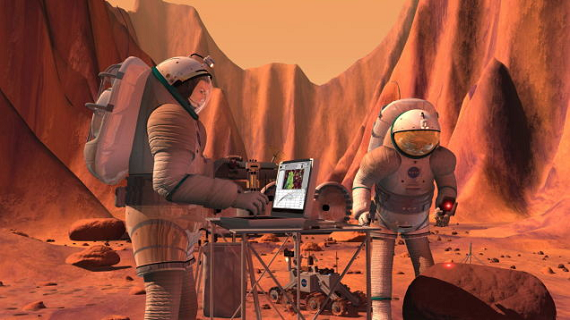
The race is on to see which company will be the one to connect everyone on the planet to the Internet. Both Google and Facebook have made the idea a top priority in recent years, and now you can add another to that list: SpaceX.
The company, which designs, manufactures and launches rockets and spacecraft, is now looking to build a new Internet, this time in space. The idea is to eventually bring the Internet to people who are living on Mars.
Yup, you read that exactly right. The Internet on Mars.
In advance of an event in Seattle on Friday, CEO Elon Musk discussed the idea in an interview with Bloomberg. The as of now unnamed project involves the launch of a hundreds of communication satellites that will orbit the earth in order to give the entire planet faster, cheaper Internet.
“Our focus is on creating a global communications system that would be larger than anything that has been talked about to date,” Musk said,
The SpaceX satellites would orbit at a much lower orbit than other satellites: about 750 miles above earth, compared to 22,000 miles. That would help speed up the Internet by shortening the distance for electromagnetic signals to travel. It would eliminate the routers and terrestrial networks that they have to go through now, instead simply bouncing between satellites until they get to their destination.
“The speed of light is 40 percent faster in the vacuum of space than it is for fiber,” Musk said. “The long-term potential is to be the primary means of long-distance Internet traffic and to serve people in sparsely populated areas.”
Obviously this is very early days for the project (I mean, it doesn’t even have a name yet) but here is what we do know: it will be based in the company’s new Seattle office. It will start out with 60 people on board, which could grow to 1,000 in just a few years.
As you might expect, this is not going to come cheap: Musk expects it to cost roughly $10 billion to build.
The more immediate goal is obviously to give everyone Internet, making it faster and cheaper, but it goes beyond that. Elon Musk is not a man who dreams small. So his ultimate plan is to set up a colony on Mars in the next decades, and use the satellites to bring the Internet there.
“It will be important for Mars to have a global communications network as well,” he said. “I think this needs to be done, and I don’t see anyone else doing it.”
Connecting everyone on the planet
While Musk is absolutely right that no one else is talking about bringing the Internet to other planets, he is not the first to come up with a plan to bring everyone living on Earth online.
Mark Zuckerberg has been spearheading the Internet.org project, which was first announced in August of 2013 with the stated goals of making access more affordable, making the use of data more efficient and helping businesses drive access. The end result of the project being that it would connect the next five billion people on the planet to the Internet.
Through its work, Internet.org has already given Internet access to 3 million new people in the Philippines and Paraguay alone.
In March of last year, it was also revealed that Facebook had started a Connectivity Lab, which the company was going to use build drones to help get the entire world online. With the drones, Facebook can give the Internet to the people.
Google also has made connectivity a priority, first with its Project Loon initiative, in which it planned to deliver Internet to the world by using balloons.
That idea is a little out there, of course, so the company is also trying to do it with more conventional means as well, revealing last year that it was planning on spending over $1 billion, in order to deploy a fleet of satellites, which will then help the company provide Internet access to all regions of the globe. lt may also use drones to complete the task: Google purchased Titan Aerospace, a company that makes high-altitude, solar-powered drones, in April of 2014. The drones can reportedly fly for years without needing a recharge.
They are joined by entrepreneur Greg Wyler, who announced earlier this week a new startup called OneWeb, which “plans to build, launch and operate a low-earth-orbit satellite constellation to help bring high-speed Internet and telephony to billions of people around the world.”
It was also announced that Qualcomm Incorporated and The Virgin Group had come on as investors, with Qualcomm Executive Chairman Dr. Paul Jacobs and Virgin Group Founder Sir Richard Branson joining the company’s board of directors.
According to Bloomberg, Wyler has spend 15 years on the problem of connecting the “other three billion” to the Internet.
So obviously there is a lot of competition to be the first to connect the planet. But only Musk is thinking about the next planet as well.
(You can see Vator CEO Bambi Francisco interviewing Elon Musk all the way back in 2010, in which he, you guessed it, talked about living on Mars)
(Image source: io9.com)
























